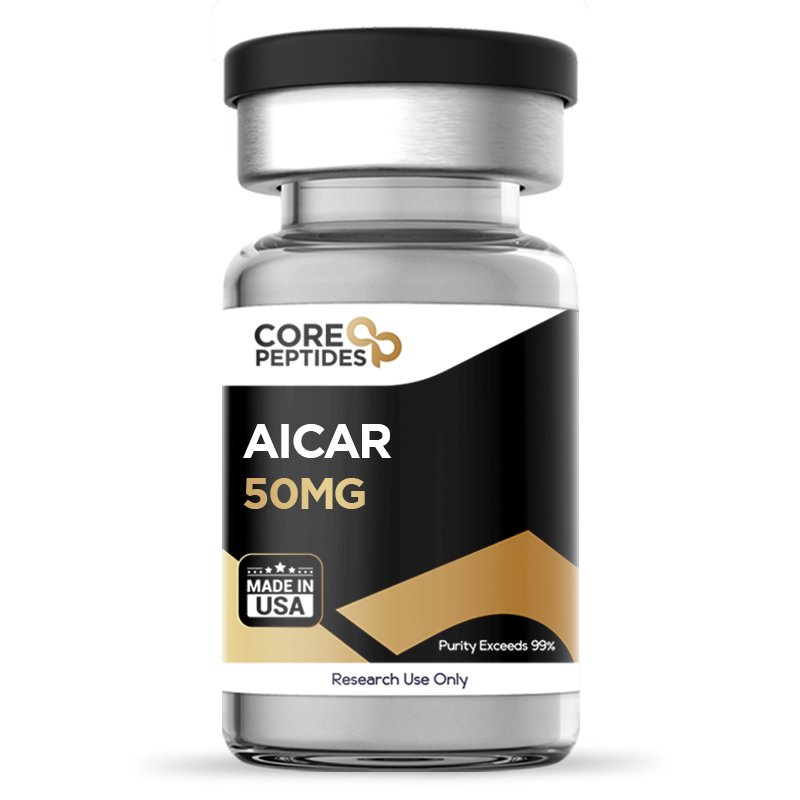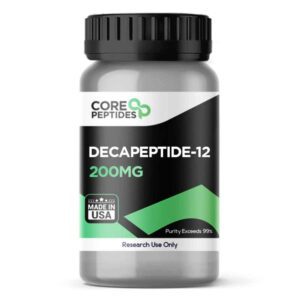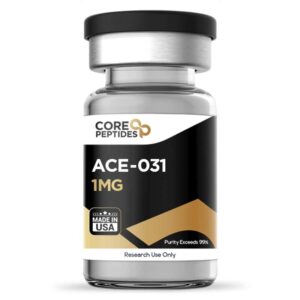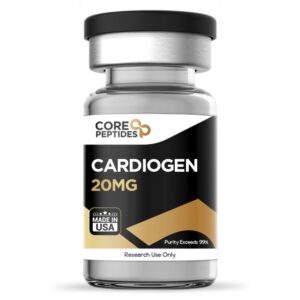Description
AICAR Peptide
AICAR (5-Aminoimidazole-4-carboxamide ribonucleotide) is a synthetic analog of adenosine monophosphate (AMP), a critical component in cellular energy regulation. It has been extensively studied for its potential to activate the AMP-activated protein kinase (AMPK) pathway, a central regulator of cellular energy homeostasis. AMPK is believed to monitor cellular energy status and maintain energy balance by inhibiting anabolic (energy-consuming) processes—such as protein and fatty acid synthesis—while stimulating catabolic (energy-generating) processes like glucose uptake and fatty acid oxidation. Through this mechanism, AICAR has drawn significant attention in studies exploring metabolic disorders, ischemia-reperfusion injury, and endurance enhancement in experimental models.
Researchers have suggested that AICAR may mimic states of metabolic stress by activating AMPK even in the absence of energy depletion. This activation appears to trigger multiple downstream pathways that may influence glucose transport, mitochondrial biogenesis, fatty acid metabolism, and autophagy, making AICAR a valuable research compound for investigating energy-related cellular mechanisms.
Overview
AICAR is a nucleotide analogue that is metabolized intracellularly into ZMP (AICA ribotide), a compound structurally similar to AMP. ZMP is posited to bind to AMPK’s γ-subunit, mimicking the effects of AMP and leading to the phosphorylation and activation of the kinase. Once activated, AMPK may alter several downstream signaling pathways, potentially improving metabolic efficiency and enhancing the body’s ability to generate ATP during times of energetic demand or metabolic stress.
Due to these properties, AICAR has been studied for its potential to promote glucose uptake in skeletal muscle, improve insulin sensitivity, enhance fatty acid oxidation, and provide protective effects in tissues undergoing ischemic or oxidative stress. It is also investigated for its possible influence on endurance performance and mitochondrial function.
Chemical Makeup
-
Molecular Formula: C₉H₁₅N₄O₈P
-
Molecular Weight: 338.21 g/mol
-
Other Known Titles: AICA ribonucleotide, 5-Aminoimidazole-4-carboxamide ribonucleotide
-
Purity: >99% (HPLC)
-
Form: Lyophilized powder
-
Storage: -20°C, protected from light and moisture
Research and Experimental Studies
AICAR Peptide and Tissue Protection
AICAR has been extensively examined for its potential organ-protective effects, particularly in the context of ischemia and reperfusion injury. During ischemic stress, cells experience oxygen deprivation and energy depletion. Studies suggest that AICAR may precondition cardiac and other tissues by increasing resistance to ischemia through AMPK activation, promoting glucose metabolism even under anaerobic conditions.
In animal models of myocardial ischemia-reperfusion injury, AICAR presentation was associated with a reduction in infarct size and improved cardiac output. Researchers propose that the observed cardioprotection may result from AICAR’s ability to enhance glycogenolysis and increase myocardial glucose availability. By converting to its active metabolite ZMP, AICAR may allosterically activate glycogen phosphorylase (GP), leading to glycogen breakdown and improved energy availability under hypoxic stress. (1, 2, 3)
Additionally, AICAR’s apparent ability to increase nitric oxide (NO) production and improve vascular perfusion may further support its tissue-protective potential. Researchers have also noted possible hepatoprotective properties, with evidence suggesting that AICAR may reduce ethanol-induced hepatic steatosis by downregulating sterol regulatory element-binding protein 1c (SREBP-1c) and fatty acid synthase (FAS), thereby mitigating lipid accumulation in liver tissues. (4)
AICAR Peptide and Insulin Sensitivity
AICAR has been widely explored as a potential modulator of insulin sensitivity due to its impact on AMPK activation. Experimental models suggest that AICAR presentation may lead to increased glucose uptake in skeletal muscle, mediated by upregulation of glucose transporter proteins such as GLUT8 and GLUT4.
In equine and murine studies, AICAR administration was associated with elevated phosphorylated AMPK levels, enhanced GLUT8 expression, and improved glucose tolerance. (5, 6) Other research has indicated that AICAR may suppress hepatic glucose output, promote fatty acid oxidation, and inhibit lipolysis—actions that collectively may reduce circulating free fatty acids and improve metabolic efficiency. (7)
Furthermore, AICAR has been shown to activate signaling pathways such as extracellular signal-regulated kinases (ERK1/2), which are involved in cellular stress responses and may contribute to its metabolic effects.
AICAR Peptide and Endurance
Research suggests that AICAR may act as a metabolic enhancer by stimulating mitochondrial biogenesis and oxidative enzyme expression via the AMPK–PPARδ signaling axis. Activation of this pathway has been associated with increased energy efficiency and endurance adaptations in skeletal muscle.
In murine models, chronic AICAR administration reportedly induced metabolic genes associated with fatty acid oxidation and mitochondrial function, resulting in up to a 44% increase in running endurance without physical training. (8, 9, 10) These findings have led scientists to hypothesize that AICAR may mimic exercise-induced physiological adaptations, making it a model compound for studying cellular endurance mechanisms.
Additionally, studies involving Duchenne muscular dystrophy models have indicated that AICAR may enhance exercise tolerance and muscle function by promoting autophagy and reducing metabolic stress. (12) Other investigations reported AICAR-mediated improvements in skeletal muscle blood flow, possibly due to increased nitric oxide production and endothelial signaling. (13)
AICAR Peptide and Malignant Cell Lines
Several research teams have explored AICAR’s potential influence on malignant cell metabolism. In studies involving B-cell chronic lymphocytic leukemia (B-CLL) models, AICAR appeared to induce apoptosis through activation of caspase-3, -8, and -9, and the release of cytochrome c from mitochondria. (14)
This effect is believed to occur via ZMP accumulation and AMPK phosphorylation, leading to metabolic stress-induced apoptosis. Interestingly, the process appeared to occur independently of p53 pathways, suggesting that AICAR may activate a distinct apoptotic mechanism. These findings point to potential avenues for understanding AMPK-mediated cell death regulation in abnormal cellular growth environments.
Summary
AICAR peptide remains a compound of high scientific interest for its potential influence on energy metabolism, tissue protection, and metabolic homeostasis. By activating AMPK and related pathways, AICAR may modulate processes central to glucose utilization, lipid metabolism, mitochondrial biogenesis, and cellular stress response. While its effects are still being studied, current evidence highlights its significance in metabolic and cardiovascular research.
References
-
Cieslik, K. A., et al. (2013). AICAR-dependent AMPK activation improves scar formation in the aged heart in a murine model of reperfused myocardial infarction. J. Mol. Cell. Cardiol., 63, 26–36. https://doi.org/10.1016/j.yjmcc.2013.07.005
-
Mangano, D. T. (1997). Effects of acadesine on myocardial infarction, stroke, and death following surgery. JAMA, 277(4), 325–332. https://doi.org/10.1001/jama.277.4.325
-
Longnus, S. L., et al. (2003). AICAR stimulates myocardial glycogenolysis by allosteric mechanisms. Am. J. Physiol. Regul. Integr. Comp. Physiol., 284(4), R936–R944. https://doi.org/10.1152/ajpregu.00319.2002
-
Tomita, K., et al. (2005). AICAR has protective effects on alcohol-induced fatty liver in rats. Alcohol. Clin. Exp. Res., 29(12 Suppl), 240S–245S. https://doi.org/10.1097/01.alc.0000191126.11479.69
-
de Laat, M. A., et al. (2015). AICAR administration affects glucose metabolism by upregulating the novel glucose transporter GLUT8 in equine skeletal muscle. Vet. J., 205(3), 381–386. https://doi.org/10.1016/j.tvjl.2015.05.018
-
Cuthbertson, D. J., et al. (2007). AICAR acutely stimulates skeletal muscle glucose uptake in healthy men. Diabetes, 56(8), 2078–2084. https://doi.org/10.2337/db06-1716
-
Boon, H., et al. (2008). Intravenous AICAR administration reduces hepatic





Reviews
There are no reviews yet.